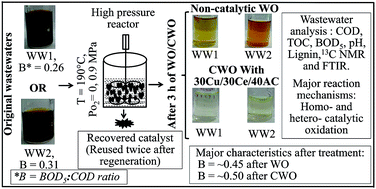Performance assessment of activated carbon supported catalyst during catalytic wet oxidation of simulated pulping effluents generated from wood and bagasse based pulp and paper mills
Abstract
In the present study, the performance of catalytic wet oxidation (CWO) was investigated for the treatment of two simulated pulping effluents (with chemical oxygen demand (COD) = 15 000 and 17 000 mg L−1, respectively) from large and small scale pulp and paper mills. CWO was performed in a 0.7 L capacity high pressure reactor at 190 °C temperature and 0.9 MPa oxygen partial pressure for 3 h duration with activated carbon (AC) supported Cu–Ce catalyst. More than 70% reduction in chemical oxygen demand (COD) and 90% color removal from the wastewaters were achieved during CWO. The biodegradability ratio of wastewater samples was improved to 0.52 from the initial values of 0.26 and 0.31, respectively. The conversion of lignin after CWO was confirmed by nuclear magnetic resonance analysis. Homo-catalytic oxidation equally contributed to organics degradation during the hetero-catalytic reaction. The detailed results on metal leaching, hydrothermal treatment without oxygen and catalyst reuse are also presented.



 Please wait while we load your content...
Please wait while we load your content...